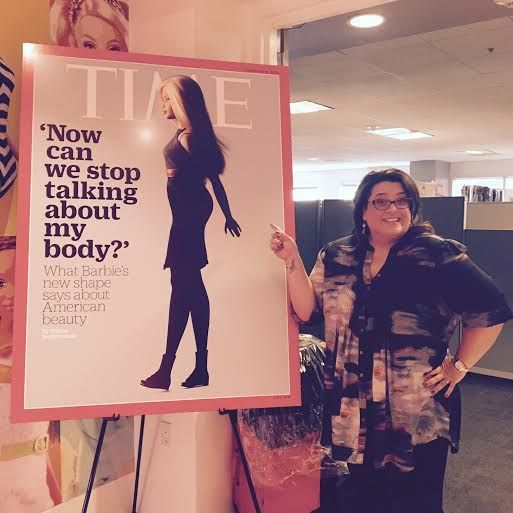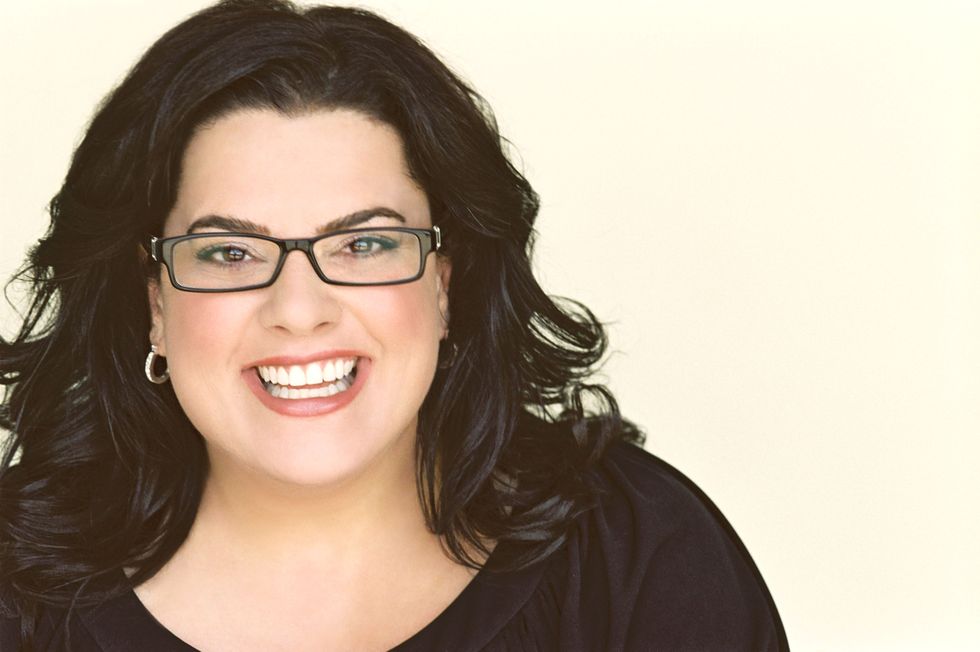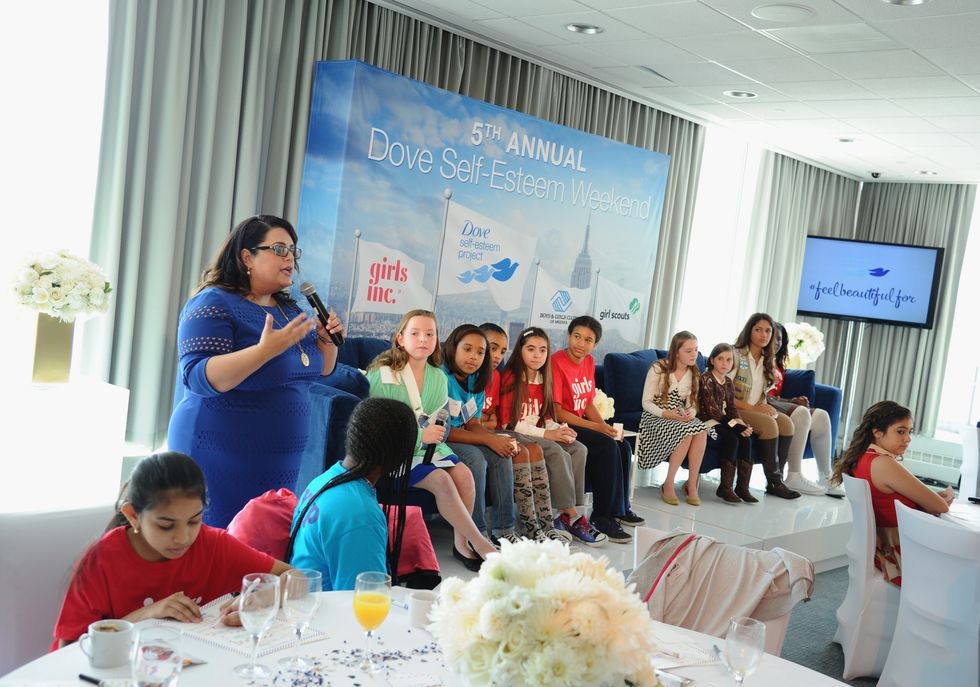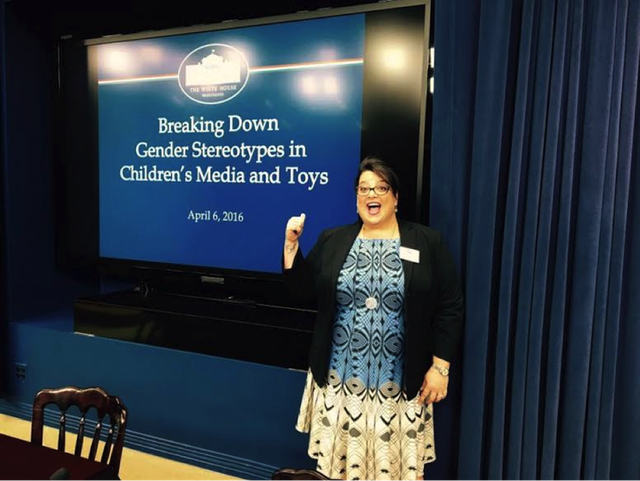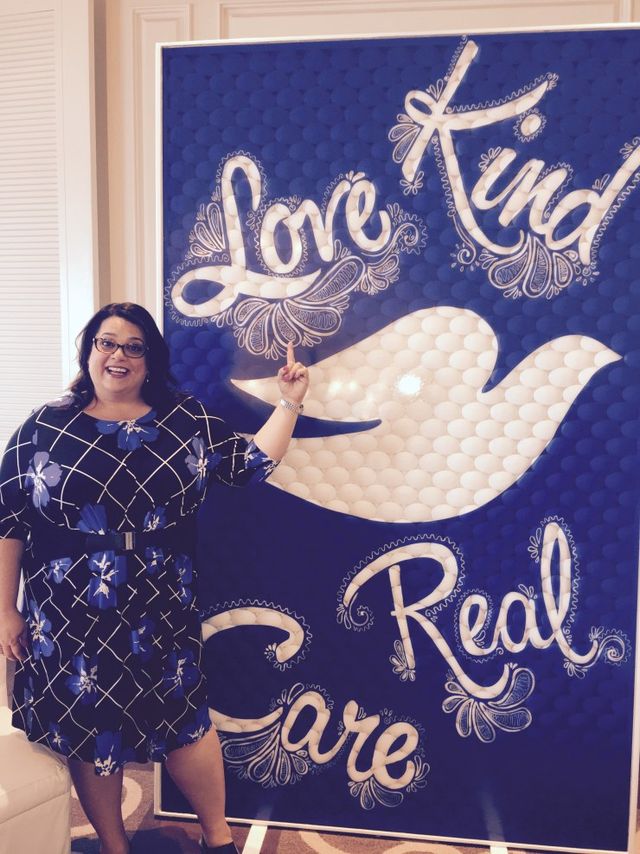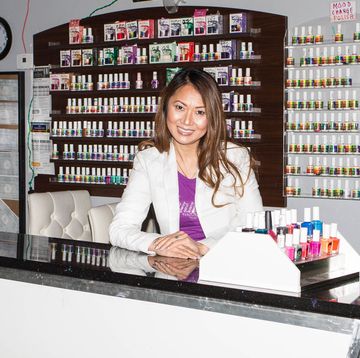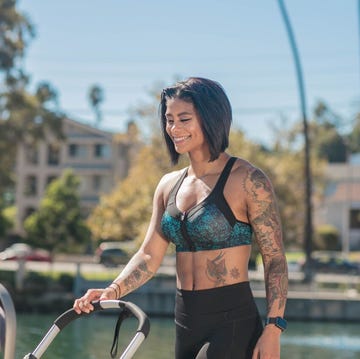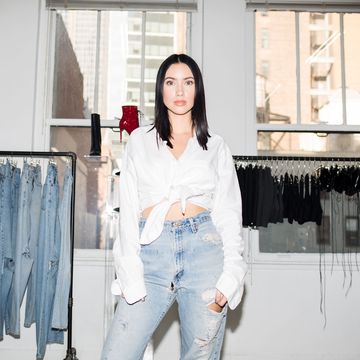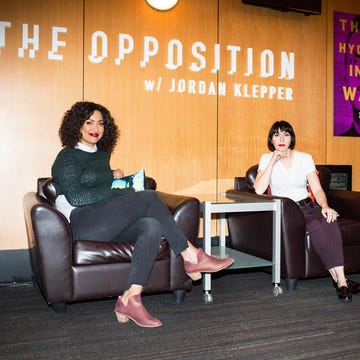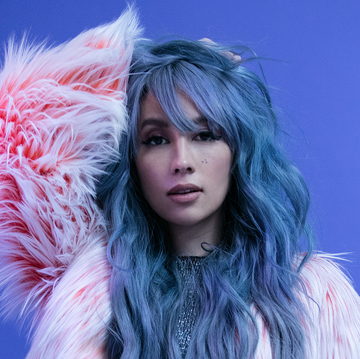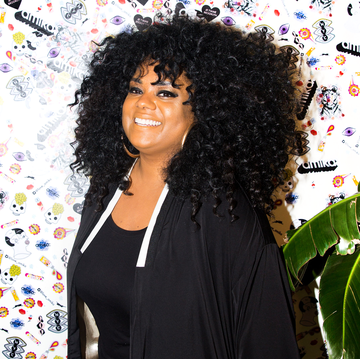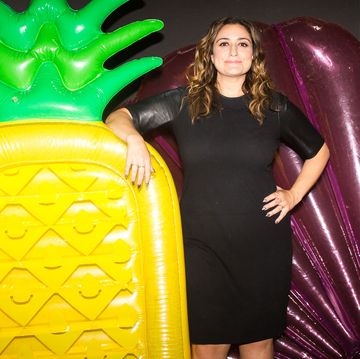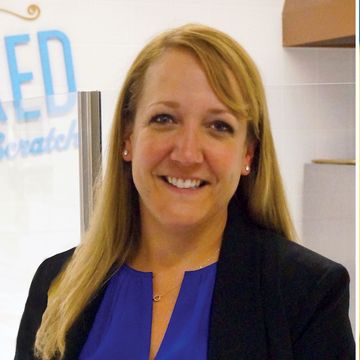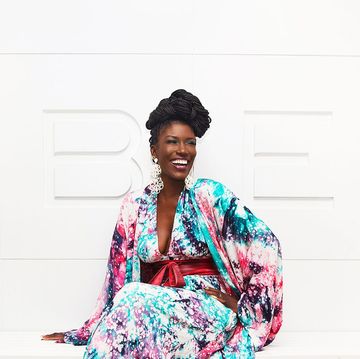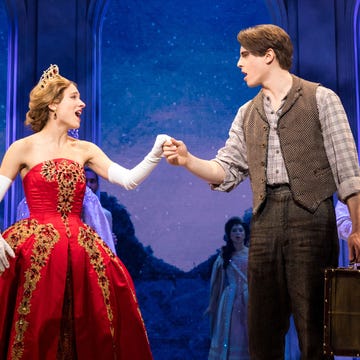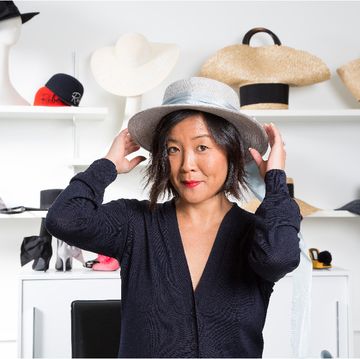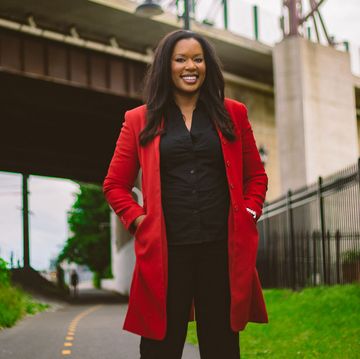Jess Weiner was obsessed with television growing up, yet she never felt represented in the images she saw on her favorite shows. After forming a social-issues theater company after college, performing plays about the problems teens face, Weiner worked in television and writing. At age 34, she launched her own consulting firm, Talk to Jess, as a way to help businesses and brands shape the messages they send about women and girls. She became a body-image consultant for Dove as it was launching its Real Beauty campaign and serves as the brand's global self-esteem ambassador. And she helped Barbie develop its latest collection of dolls, released earlier this year, which represent different body types.
Weiner has become an in-demand expert on issues of self-confidence and self-esteem. She says all her work is in the pursuit of helping women and girls feel less alone.
I struggled with an eating disorder in high school and college. It didn't have a name then; now it's called EDNOS, an eating disorder not otherwise specified. It's a catchall phrase for anyone who doesn't present as anorexic or bulimic. After-school specials — which were basically soap operas about teen issues that aired in the afternoons — made me realize I wasn't the only one struggling.
I went to Penn State as a theater major. During my sophomore year, which was 1992, after a very intense group therapy session for women with eating disorders, I came home and started to freeform write about all these stories I heard in therapy. I wrote for eight hours straight and at the end of that creative burst, I had the outline of this play called Wake Up World, a series of vignettes that looked at the social issues surrounding body image and eating disorders through the lens of a 19-year-old.
I grabbed a bunch of actors I knew and we started rehearsing it the next week, and we started performing it on campus four weeks later. It gave me a framework to express these things I had been holding inside for so long. It helped tremendously with my recovery.
After the first performance, an unexpected thing happened: People didn't leave their seats. They seemed to be processing what they just saw. Some people were crying. I came out on stage and started talking to the audience. I didn't have that planned. A girl raised her hand and said, "You just wrote my story."
I was shocked. She was the polar opposite of me — tall and blonde and tan and thin; she had lots of friends, dressed really well, and looked really happy. She embodied all of my perceived stereotypes of what it meant to be perfect, and yet she was relating to everything emotionally that I was going through. I realized that I could take my pain and turn it into an art piece that would inspire someone else. I thought, How do I make a career out of this?
After I graduated, I moved to Indianapolis with my boyfriend. My first and only "real job" after college was working at a Lerner's clothing store. I'd hear women in the dressing room saying horrible things about their bodies. I started talking to them about body image, and what it meant to be beautiful and accepting yourself. They ended up buying thousands of dollars worth of clothes. Lerner's wanted to make me a manager because they thought I was a great salesperson, but all I wanted to do was talk to women about the issues I cared about. So I quit after five days. I knew there was something else I was supposed to be doing.
I took a grant-writing class at a local community college. My proposal was to put together a theater company that focused on social issues, similar to the work I did in college. After submitting several proposals, I received a $5,000 grant from a local business and I started a theater company called Act Out Ensemble.
I hired six people and paid them $11 per show because I thought it sounded better than $10. We started doing some of the plays I had written in college. We started to gain some attention and a little press in Indianapolis. Another local business gave me a grant, which allowed the theater company to start touring schools. We performed at middle and high schools locally, then regionally, then nationally. After each performance, we had feedback sessions where members of the cast and I would talk to the kids, answer questions, and dig deeper into these issues.
The first five years of my career I didn't make more than $30,000 per year. I graduated without debt, which is absolutely what allowed me to pursue this dream. I shared bills with my boyfriend and the cost of living was really low in Indianapolis.
We went out to Littleton, Colorado, six months after the Columbine massacre in 1999 and performed for students who had survived. We did a show I had written called Battered Souls about the life of a school shooter. At the end of our feedback session, a girl stood up and held up her backpack, which was full of bullet holes. She said, "I wear this backpack as a reminder that my best friend died and I didn't. We were both under the table at Columbine and I don't know why I didn't die."
I remember thinking, I want the world to hear these stories. I knew my plays could only reach so many people. That was my turning point for deciding to move to Los Angeles and make a television show.
I heard about a television pitch program put on by the National Association of Television Programming Executives. I wanted to do a talk opera, like I had been doing on the road with my theater company. The first half-hour would be a scripted drama or soap opera focused on teen issues, and the second half would be a talk show discussing the issues. I won the competition and my prize was a couple of meetings with executives in Hollywood.
I left my theater company in the hands of two of my sponsors in Indianapolis. I ended the relationship with the boyfriend, and I drove cross-country with a friend. I knew one guy, a friend from Penn State, who parked cars at a hotel in Beverly Hills. I lived off my savings for a year.
I went on about four meetings with development executives at different TV companies. They were interested in the conversations I was having, but I don't think they thought about youth culture the way I did. I had one female executive say that she didn't think women really wanted to feel good about themselves.
I had shot a trailer of my show idea and I had it on a VHS tape. I gave a copy to my friend who parked cars. He called me one day saying, "I have a boy band staying at my hotel. I don't know who they are, but I'm going to leave your tape in one of their cars." It happened to be Jeff Timmons from 98 Degrees, which was huge at the time. My friend was smart enough to look up Jeff's manager's name and I called this guy for two weeks straight. He picked up one day, and Jeff came into the room and took the phone. He said, "Oh, hi. I got your tape. I'll call you tomorrow." And he did. Jeff became my champion to try to get this talk opera produced.
I cast a bunch of actors in L.A. and paid them from my savings. We did a live pilot called Survival High, about what happens to a high school after a school shooting. We did the show, and then we did the feedback session with kids we bussed in from local high schools. This showcase was in the summer of 2001, a little less than a year since I had been in L.A. We had interest from a kids network to do the show. We went to New York for development meetings. I flew home on Sept. 10 so excited that this was happening.
And then the whole world changed. All of the executives we were working with left the network and got out of the business. Like everyone, I was devastated by what happened on 9/11, and it was hard for me professionally because I had gotten very close to a dream and it didn't happen.
I started booking appearances at colleges across the country to talk about self-esteem and teen issues. A talent scout from Warner Brothers came to one of my talks and I ended up getting a development deal for a talk show.
I learned how hard it is to shop a TV show without being famous. I had great people who believed in me, but the public at large didn't know who I was. They couldn't sell advertising against my name. And this was the same time Ellen DeGeneres, Tyra Banks, and Sharon Osborne were starting their shows. I was in development for three years, which meant they basically paid me so I couldn't work anywhere else. I could still do speaking engagements, which at least helped me get my name out there.
I started to appear on other people's talk shows. I was the self-esteem expert on Tyra for a while. I appeared on Oprah as an expert, and I did a lot of freelance writing for Seventeen, Cosmo Girl, and Mary Kate and Ashley Olsen's website, which had a strong teen following. I started a company so I could handle all of these requests for TV appearances and speaking engagements and writing contracts. The company was very bare bones: me plus a CFO to handle the money and contracts, and an assistant to help me with scheduling.
In 2006, I was approached by Dove. They were working on a new campaign focused on real beauty. They reached out to me to create curriculum for teens around body image and self-esteem. While Dove didn't have products for girls, they discovered through their research that only 2 percent of women around the world describe themselves as beautiful. Their biggest desire was to change that mindset for the next generation of girls.
I was very excited about the campaign, but I was also very nervous because I had never worked with a big company. I had built up credibility in schools without a sponsor. What will people think if I start to partner with a big organization like this? It took me eight to nine months of communications with Dove to make sure it was the right fit. I decided to sign on and became their global self-esteem ambassador.
It's more of a partnership than a job. I helped to write and create the self-esteem workshop curriculum that Dove uses at schools, communities, and partner organizations around the world. Over the past 10 years, we have reached over 19 million girls with self-esteem programming. I also facilitate those workshops and have helped to train additional self-esteem educators and trainers worldwide.
I help to advise on strategy and messaging. I also speak publicly on behalf of the brand and host self-esteem workshops for girls, and special events with celebrities, such as a recent Times Square takeover we did with Keke Palmer where we had a live conversation about beauty with hundreds of girls.
I remember standing behind a woman in Times Square when she was looking at the first Dove Real Beauty billboards and she whispered to her friend, "Oh my gosh, that looks like me," and the sound of her voice was relief, gratitude, amazement, and wonder. I knew it would spark a nerve. None of us knew just how deep the conversation would go or that it would serve to be the catalyst for cultural conversation 10 years later.
After working with Dove, my business, Talk to Jess, began focusing more on consulting with brands. Industries from pharmaceutical to automotive to tech were all looking to better understand what was going on in the inner lives of women and girls.
Mattel reached out to me in 2011 when they were working on a redesign of the Monster High dolls. Girls loved them, but parents were concerned about the imagery — too thin, maybe dressed a little inappropriately. I set up face-to-face meetings with Mattel, parents, and experts in parenting, girl development, sexualization, and education.
After that experience, I was invited to be a thought partner on the evolution of Barbie. I sat with key executive leaders, designers, marketers, and brand experts to bring cultural and body image awareness to the new Barbies. When the new dolls came out in January this year, reflecting, for the first time, different figures, it felt like a gift. I was helping to change the image of one of the most iconic brands in the world to make more girls feel included.
At the core, my work is about challenging the media, marketing, and advertising business that has an incredible impact on the images we export around the world and consume here at home. The system is broken, and there's no simple fix.
If we all continue to collectively make our media spaces more inclusive, more positive, and more questioning of mainstream cultural standards, we can empower the next generation.
Talk to Jess has grown into a multimillion-dollar consulting firm. But what makes me feel like the richest person in the world is every time I hear from women and girls who have been touched by my work. I have two file boxes full of letters and cards and printed-out emails from people who have been impacted by something I've shared. On some really crappy days I'll pull out a couple and get reconnected.
I'm still a work in progress. I have way more better days than I've ever had, but I definitely still struggle with my own self-esteem. In those moments, I remember who I am. I want all girls to know that on the other side of pain is progress.
Get That Life is a weekly series that reveals how successful, talented, creative women got to where they are now. Check back each Monday for the latest interview.
Follow Heather on Twitter.
